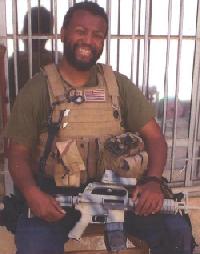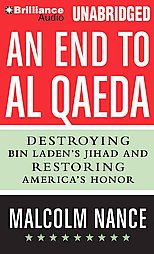An Arabic-speaking counterterrorism expert and a combat veteran with twenty-eight years of operational experience in the Middle East, Malcolm Nance has now published a sweeping new strategic proposal for engaging Al Qaeda. I put six questions to him about his book and the continuing debate about waterboarding propelled by former Vice President Cheney and his staffers.
1. Peter Bergen, among others, has made the case that the tide has turned in the battle against Al Qaeda. He says the organization misplayed its hand with radical tactics that cost the lives of large numbers of Muslim civilians. Is he too optimistic?

I believe Peter Bergen is a little too optimistic but generally on mark. Yes, Al Qaeda has suffered massive losses in Iraq and some significant degradation worldwide. In Iraq their one-time sponsors, the ex-Baathist insurgents, found them in the end to be ideologically dangerous and turned on them. Initially, the Iraqi insurgents loved the effect that the Al Qaeda suicide operations had on the Americans. Once the Sunni insurgents realized that Bin Laden’s reinterpretation of Islam would undermine the existing Iraqi tribal structures, and that Al Qaeda would engage in the mass murder of Muslims, they turned against Al Qaeda and helped us gain the upper hand. Militarily, Al Qaeda is boxed into Iraq, Afghanistan, Somalia, and Yemen–but their cult-like ideology could infect the youth of the Muslim world. The risk remains that they will achieve a generational success by transforming Islam. That would make our recent military campaigns into pyrrhic victories.
2. You suggest that the key to defeating Al Qaeda lies in “counter-ideological warfare.” What do you mean by this?
Bin Laden’s dream, which will likely survive his death, is not just to radicalize Islam but to transform it into a global virus that destroys the tradition of tolerance and puts in its place perpetual jihad and suicide martyrdom. His ideology feeds off hatred of the West. He wants to harness Muslim popular anger at Western missteps to root out the tradition of tolerance in Islam. If he has to massacre innocent Muslims to do that, he won’t hesitate to do so.
Al Qaeda’s ideology has little to do with traditional Islam. Some call it al-Qaedaism; I call it Bin Ladenism. This fanatical ideology, not a command-and-control structure of a traditional sort, is the organization’s center of gravity. It must therefore be fought with the tools of counter-ideological warfare. That means that we recognize, attack, and neutralize their central belief system using all political, diplomatic, intelligence, military, and economic tools. The starting point is therefore to drive a wedge between Al Qaeda and Islam. The Muslim world needs to understand that Al Qaeda’s ideology has nothing to do with the pillars of Islam. When Al Qaeda is isolated and recognized as a radical cult, it will lose the ability to generate new recruits.
3. You dedicated your book to Mohammad Salman Hamadani. Who is he and why did you choose to honor him this way?
“Sal” was an American of Pakistani descent who went missing on 9/11. There was an investigation and speculation that he was involved in the plot. In fact, he was a New York City police cadet and paramedic who had raced to the scene and who died trying to save lives. Several months later his body was found at the WTC site. He is the truest face of both American and Islamic heroism.
4. You say that the United States needs to target Al Qaeda with a public-diplomacy campaign that you call circuit breaker. Explain your proposal and why you think Bush-era public diplomacy fell short.
The entire eight-year effort under Bush targeted Americans, not the world or Al Qaeda supporters. Bin Laden benefitted immensely from massive policy errors such as the invasion of Iraq. circuit breaker is designed to reverse these losses and break Al Qaeda’s global base of support. Bin Laden’s deputy, Ayman Al-Zawahiri, noted that losing the Muslim world’s support would utterly destroy Al Qaeda. This strategy, which would cost only a fraction of the hundreds of billions spent on military operations, would attack Al Qaeda in the realm of public opinion in the Islamic world and would reposition America and Americans as partners rather than an opponents.
5. You previously served as a master instructor in the SERE program, in which pilots were prepared, among other things, to endure waterboarding. The SERE training program, we later learned, was reverse engineered to produce “enhanced interrogation techniques” for the CIA. Recently a White House speechwriter named Marc Thiessen has played a vocal role in the campaign that the Cheneys have launched to justify the use of waterboarding. He insists that it absolutely is not torture, and he insists that it’s different from the technique used by the Khmer Rouge. Does Thiessen know what he’s talking about?

I spent twenty years in intelligence and four years in the SERE program waterboarding people before I ever opened my mouth on the subject. Marc Thiessen is a fool of the highest magnitude if he thinks he knows anything about waterboarding. His claims are based not on first-hand experience but on a classified briefing from people with an agenda of justifying what was done. That makes Thiessen into a court stenographer for war criminals rather than a person with any real claim of expertise. As for his claim about the relationship between Pol Pot–era waterboarding and what we have done derived from the SERE program, he’s wrong. Before I arrived at SERE, I went to S21 prison in Cambodia. Right next to the Wall of Skulls sits the exact waterboard platform that the SERE program copied for our own use in the training program. Remember, our goal was to prepare pilots for the techniques they might face if they fell into the hands of our enemies. I was waterboarded on arrival at SERE, and then as a senior staffer, I performed the technique or supervised it through hundreds of evolutions.
Thiessen’s central purpose is apparently to glorify the most extreme practices used by the CIA in the Bush era and to argue that each of these practices, including waterboarding, is vitally necessary to our national security–even though no president used them before, and it seems that President Bush himself halted many of these practices over Cheney’s objection. We have prosecuted and convicted men for using these techniques in the past, and we were right to do so.
This suggests to me that, while he may cite Thomas Aquinas, Thiessen has no sense of honor and no moral compass. I give him credit for his loyalty to the Cheneys, but he’s blind to their errors in judgment. The use of waterboarding and other torture techniques was a powerful recruitment tool for Al Qaeda; it spawned thousands of would-be suicide bombers. Thiessen claims that we gained “intelligence” by using these torture techniques. But this shows that he knows nothing about the intelligence process or how our enemy grows and sustains itself.
Thousands of American POWs died and suffered resisting torture practices that we have always called the tools of the enemy. The SERE program was designed to help them grapple with this inhumanity and retain their dignity in the face of it. Now Thiessen and his boss want us to embrace the tactics we used in that program–taken from the Russians, the Communist Chinese, the North Koreans, the North Vietnamese, the Khmer Rouge–as our own. He claims that these techniques are unpleasant but have no long-term physical or mental impact. Really? I challenge him to put up or shut up. I offer to put him through just one hour of the CIA enhanced interrogation techniques that were authorized in the Bush Administration’s OLC memos–including the CIA-approved variant of waterboarding. If at the end he still believes this is not torture, I’ll respect his viewpoint. But not until then. By the way, I can assure you that, within that hour, I’ll secure Thiessen’s written admission that waterboarding is torture and that his book is a pack of falsehoods. He’ll give me any statement I want in order to end the torture.
6. Barack Obama grew up in part in the Muslim world and has an unusually deep understanding of Muslim culture and tradition. Does this provide any special opening in the war against Al Qaeda?
There is great opportunity to use the goodwill surrounding Obama, and particularly the fact that he was raised in the world’s most populous Muslim nation, Indonesia, to creating a new era in American-Islamic relations. At the heart of my circuit breaker proposal is an effort to reframe America and Americans. Al Qaeda portrays us as Muslim-hating militarists. We need to be seen as a strategic partner in an effort to fend off a foe which is as much a challenge to Islam as it is to the West. Many leaders of the Muslim community desperately want this rapprochement. Our initial efforts against Al Qaeda were sound militarily but very clumsy on the field of public opinion. They have led to military successes, but those victories will be short-lived if we cannot win the struggle with Al Qaeda for hearts and minds.


